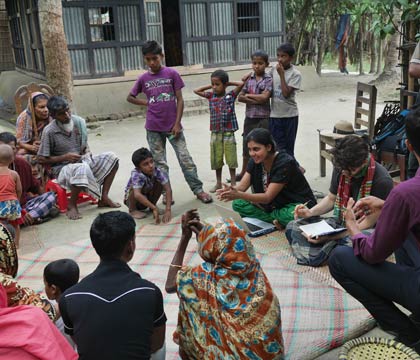In the 1970s, tube wells were dug in rural Bangladesh to fight disease through cleaner water, but surrounding soil contaminated the well water with arsenic, a powerful carcinogen. Today, the largest mass poisoning in history is responsible for more than 40,000 deaths every year in the country.
Shahreen Reza (BA 2007 Trinity), who was born in Bangladesh and grew up in Norway and Canada, has been working on a solution for years. Reza, a screenwriter, learned of a whisky-manufacturing waste product – compressed barley husks – that can remove pollutants from water. Studies showed that a similar filter, made from coconut husks, abundant in Bangladesh, would be inexpensive and easy to use. “It needs to be changed only once every three or four months,” she says.
In 2013, Reza founded PurifAid, a non-profit dedicated to introducing the filter system to existing wells in rural villages. With a grant from Grand Challenges Canada and two NGOs, BRAC and the International Centre for Diarrhoeal Disease Research, she and her fellow volunteers are looking forward to large-scale implementation. “Everything will be manufactured in Bangladesh,” Reza says. “We want to help the local economy and make sure the filter can be made entirely in the country – by and for Bangladeshis.”
Recent Posts
U of T’s 197th Birthday Quiz
Test your knowledge of all things U of T in honour of the university’s 197th anniversary on March 15!
Are Cold Plunges Good for You?
Research suggests they are, in three ways
Work Has Changed. So Have the Qualities of Good Leadership
Rapid shifts in everything from technology to employee expectations are pressuring leaders to constantly adapt





